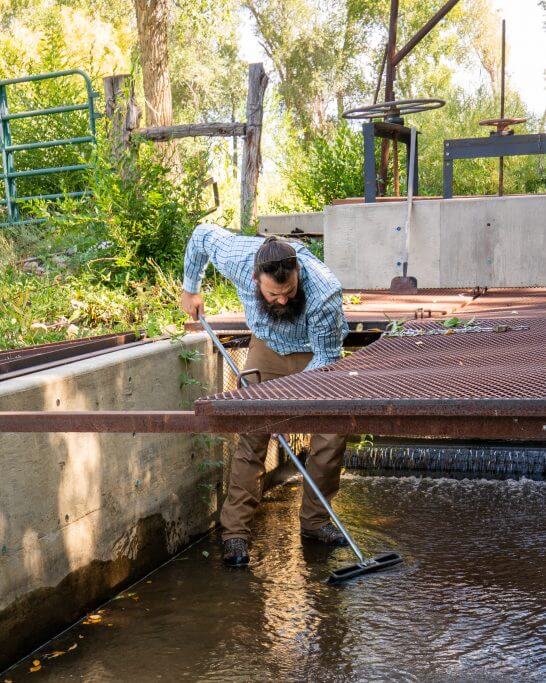Modernizing Irrigation Infrastructure with Colorado Farmers & Ranchers
In just six months, three new Project Coordinators, working with Colorado ditch companies and farmers and ranchers, have identified over 50 multi-beneficial projects to implement across the state. These projects will save water across the state, benefiting agricultural producers and the rivers they depend on. River Network supports these Coordinators as part of our continued and expanding focus on healthy rivers in agricultural landscapes.
But let’s set the stage: Colorado farmers and ranchers are proud to produce the food, fiber, and scenic landscapes enjoyed by the public. As Colorado’s second-largest economic sector—and the largest user of the state’s water— farms and ranches provide employment for 173,000 Coloradans and contribute $40 billion to the economy. Couple this with average annual precipitation at just 15 inches, and much of Colorado’s agriculture is dependent upon irrigation, diverting more than 86% of the state’s surface water to produce that food and fiber.
“As a steward of the land and water, and as a rancher, it’s part of my duty to care and actually take action. That’s part of the job description,” Ben Wolcott , a rancher near Mancos, CO, says. “Agricultural producers have everything to lose or gain by [river health]…Planning for the future of agriculture and our rivers is important enough that it deserves my time.”

Ben Wolcott, a local rancher near Mancos, Colorado, cleaning a ditch. Photo by Lauren Harper.
While working on Stream Management Plans (SMPs) across Colorado since 2017, we heard from partners that there was a significant demand by local agricultural organizations to become effective advocates for projects that integrate irrigation water management, irrigation infrastructure improvements, river flow restoration or leases, and management of private riparian lands. Producers like Ben want to protect their local rivers, too.
What these groups said they needed was additional support to overcome capacity challenges around meaningful outreach to landowners, and increase both their knowledge of available funding sources, and their access to appropriate technical skills to develop project plans.
In response to this need, we launched this two-year pilot program in 2021, placing Project Coordinators, in two regions that needed support: the Yampa Basin, near Steamboat Springs and the Southwest Basin, near Mancos. Jeff Clynke, a local farmer, and Gena Hinkemeyer, a local stakeholder who was originally involved with the Yampa IWMP, both work as Coordinators with Community Ag Alliance in the Yampa Basin. In the Southwest Basin, Gretchen Rank, the Executive Director of the Mancos Conservation District and a long-time subsistence farmer, took on the role of the Coordinator. The pilot program increases the capacity of local organizations to up the quantity and quality of multi-benefit projects on private lands, working towards ensuring equitable access to resources to modernize aging irrigation infrastructure.
Jeff, Gena and Gretchen began providing project “life-cycle” services to ditch companies and private irrigators, developing modernization strategies and navigating the complex process of securing funding for project development and implementation. This work begins by having a conversation with irrigators, and often walking the land together, to learn about what improvements need to be made. These conversations lead to ideas for projects, which the Coordinators use to begin scoping out the feasibility, impact, design and funding opportunities. This support helps irrigators actually be able to implement projects that not only benefit them but are also benefit the health of the river.
In the first six months of the Initiative, project coordinators identified over 50 multi-beneficial projects and are in the process of ranking projects for funding proposals. These projects include diversion upgrades, fish and boater passage, riparian habitat and bank erosion, fish habitat creation, and river restoration. All of these projects help keep water flowing for both agriculture and the environment.
As we look forward, we plan to expand this beyond the pilot program, putting in place a state-wide network of experienced irrigation project coordinators to support producers and local rivers. In line with the Colorado Water Plan, the Initiative will prioritize the development and implementation of irrigation modernization projects identified through diverse, collaborative processes such as basin roundtable identified projects and processes and integrated watershed management planning efforts.
“I want to manage our ranch so that it’s here for future generations to enjoy. And I can’t think of anyone who can do it better than me because I know what it needs right now and right here. And I really enjoy the life that we have and I want my kids to have that opportunity,” Ben says.
Colorado farmers and ranchers are critical players in river health projects and planning. Their collective land and water management actions are often the single most important factor that influences the health of a river or stream. We recognize the stewardship role of agricultural producers and support locally driven solutions to meet their water management needs while also protecting and improving the health of the rivers farmers and ranchers depend on.






[…] Modernizing Irrigation Infrastructure with Local Producers […]
[…] River Network has been hearing about these capacity challenges since we began supporting organizations that lead Stream Management Plans back in 2017. In 2020, we took action and launched a pilot program to provide rural, agricultural organizations in two Colorado river basins (Yampa and Mancos) with resources to increase the quantity and quality of multi-benefit projects on private lands. (read more about the program). […]